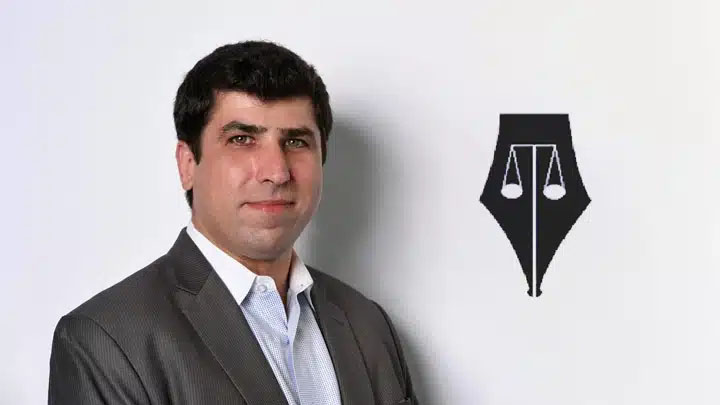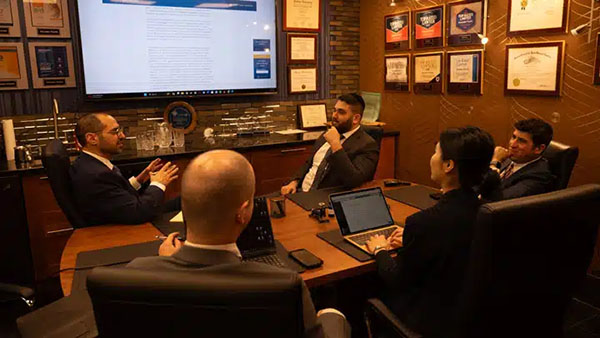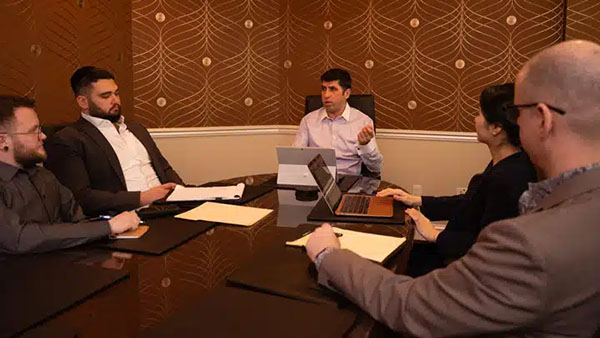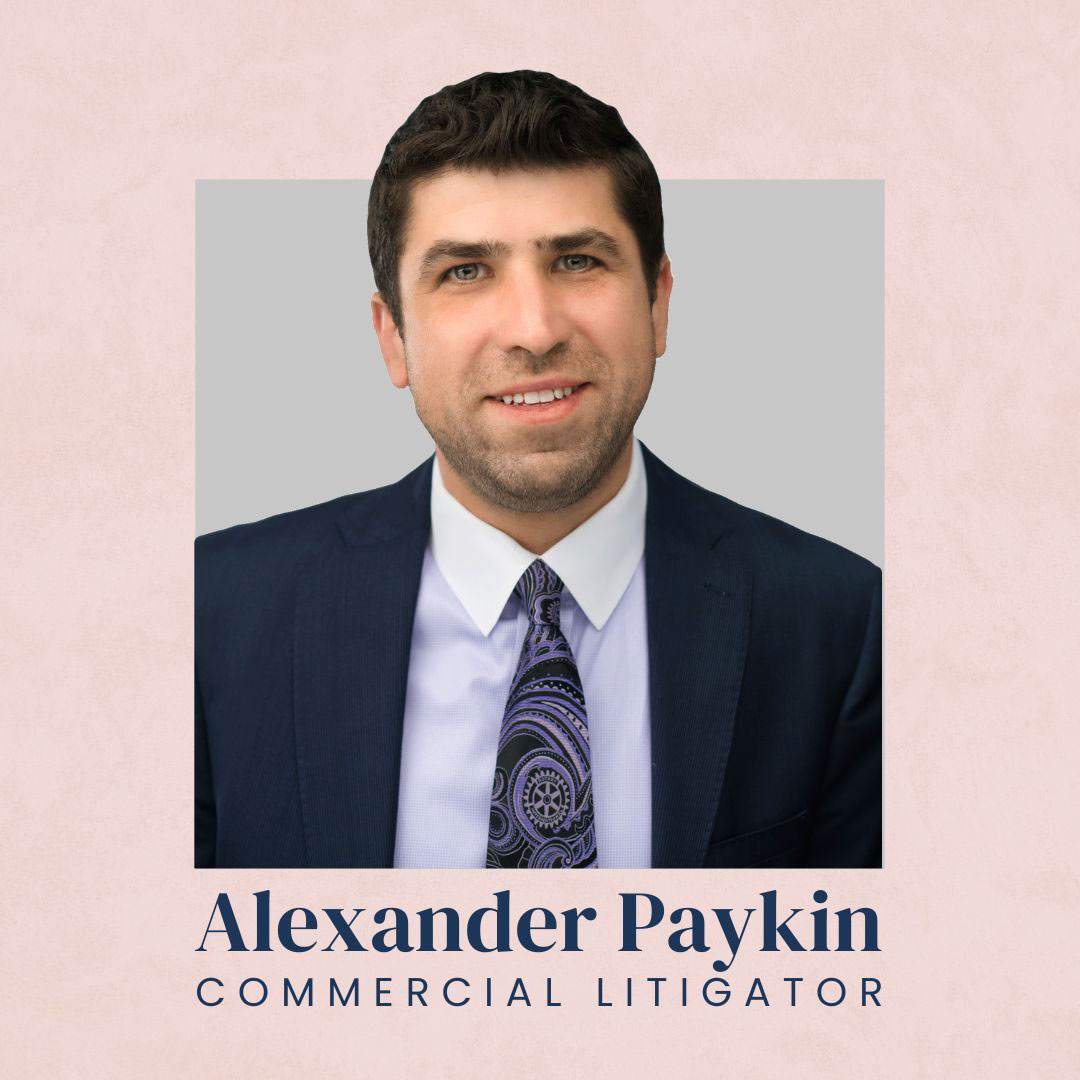CATEGORIES
Careers | Education and Life Skills | People We AdmireOverview:
- Alexander Paykin’s childhood was significantly shaped by his family’s immigration from the Soviet Union when he was 9 years old.
- Witnessing the profound impact of a lawyer on his family’s life during this time left a lasting impression on him, sparking his interest in the legal field.
- He briefly ventured into financial consulting before focusing on real estate and commercial litigation, eventually establishing his law practice.
- He takes great pride in the evolution of his law firm from a solo practice to a thriving office with around 10 staff members.
- He stresses the importance of having a clear vision and drive to pursue goals.
1. Tell us about your childhood and how your experiences influenced who you are today.
My professional journey was shaped by a few pivotal moments in my life, including my family’s immigration from the Soviet Union when I was 9. While the U.S. government had extended an invitation to all Jews to leave with the implicit promise of guaranteed visas, the path was not straightforward.
On our transit through Italy, we faced the uncertainty of a separate visa application process and found ourselves amidst thousands of stranded immigrants with no financial means. My parents took on menial jobs to make ends meet. Just as hopelessness began to set in, a high-priced attorney arrived in our town, gathering all the immigrants for a Q&A session. Touting his impressive approval record and promising to submit our applications, his services came at a substantial cost. My parents scraped together every penny and borrowed from known people to pay this lawyer. Panic began to set in as months passed and my parents feared they had been swindled. But then, a letter arrived congratulating us on the approval of our application and outlining the next steps. Witnessing the profound impact of a lawyer on the lives of my family stayed with me.
Fast forward to my American high school years, where I reignited the school’s dormant mock trial team. To garner interest, I went door-to-door through the classrooms and managed to assemble a team as its de facto captain for three years. The experience of running the team and participating in mock trials fueled my passion for law, particularly litigation.

In high school, except for a fourth year of gym, I’d fulfilled all high school obligations and taken all the AP classes. Perhaps with the eagerness to become an adult, I drafted a lawsuit and threatened to sue my high school after not receiving any attention in asking for early graduation. Getting serious with my threats, I negotiated a deal that allowed me to start college a year early on the condition of taking two semesters of physical education in the first year of college. My parents were confused and surprised (seeing as I had told them nothing of my plan until after I had completed the negotiations and gotten accepted to SUNY’s Stony Brook University), but the whole experience was fun.
Although initially drawn to computer science in college and even establishing an IT company to develop custom software for lawyers and doctors, the scarcity of tech opportunities when I graduated in 2002, right after the tech bubble burst, led me to reassess my path. I discovered my true calling in litigation – relishing the thrill of working with witnesses, depositions, and evidence, and those eureka moments that come with it, I decided to attend law school.
Post law school, I briefly ventured into running a financial consulting company with a couple of friends, but legislative changes forced us to reconsider the business model. To gain more experience, I pivoted to working as an associate attorney in real estate and commercial litigation. Concurrently, I established my own practice, and as years passed, I expanded into various areas of law. Today, my firm is growing, and broadening our scope from being a primarily litigation and complex transactions firm focusing on real estate and commercial law, to include related practice areas, such as bankruptcy, immigration, employment, trusts, and estate law.
2. What has been the highlight of your career?
I take great pride in how my firm, Paykin Law, has evolved in the last 9 years. In 2015, after learning some tough lessons about partnerships, I restarted my then-solo practice from scratch. Today, we are a thriving office with an effective staff of about 10, occupying three commercial suites, which have been combined into a massive space, thoroughly decorated in firm colors. We have a highly competent and dedicated staff, and the firm operates like a family. I can count on the attorneys who work with me to uphold the same high standards that I do. Looking back, it’s been a difficult journey, but the results are worthwhile.
One of the things I’m most proud of is the stability and freedom I’ve achieved as a result. When General Needs, a veterans’ charity I support, announced its inaugural gala, I did not have to think twice about becoming its main sponsor and reserving the most expensive table for my staff and colleagues. The fact that my firm runs well and has both technology and human processes in place to function with me being anywhere has given me the ability to contribute meaningfully to the charities I care about, without hesitation, and the flexibility to dedicate substantial time to giving back to the profession and the community.
I teach CLEs, present at conferences, and serve on various committees and boards, including being a board member of General Needs and secretary of the board for Brighter Tomorrows, a domestic violence shelter network. Previously, I also served two terms as President of the Board for the Commack-Kings Park Charitable Fund. This ability to make a positive impact while maintaining a successful practice is truly gratifying.

3. What has been the greatest challenge in your journey, and how did you overcome that?
I’ve faced several challenges throughout my life. At the age of 9, during immigration from the Soviet Union, I took on various jobs to help support my family. In Italy, I struck deals with a local pastry shop and restaurant to wash their windows each morning in exchange for unsold food, which I would bring home for my parents to distribute in our neighborhood. In the evenings, after finishing my homework, I’d head to a local pub to wash cars in the parking lot for tips. The pub would also give me unsold food to take home. While it might seem like an ordeal, it was an invaluable early lesson in business and resourcefulness.
Later, negotiating my way out of high school, attending college while working full time, and managing multiple startups, all stand out as challenges. These experiences have taught me the importance of perseverance, creative problem-solving, and seizing opportunities – skills that have served me well throughout my professional journey, as I’ve navigated the complexities of starting and growing my own law practice.
4. What does your typical day today look like?
My daily routine varies. It typically kicks off with going through emails upon waking. The trajectory of my day largely hinges on these emails and the initial calls I make or receive within the first hour. Ensuring that time-sensitive tasks are on track involves brief check-ins with my senior paralegal and often a couple of associate attorneys. Throughout the day, I might be in court, at one of our offices, working remotely either at a client site or from home, or traveling for committee meetings, board sessions, professional conferences, or consulting engagements. Tasks usually entail phone calls, emails, texts, WhatsApp messages, LinkedIn inquiries, amongst others. If all goes well, I wrap up my day before 8 pm. Thanks to our fully cloud-based setup, when I’m on the road teaching or traveling for work, my firm always stays with me, granting me unfettered access to all the resources across my mobile devices.
5. What would you say are some of your most important life values and how have they shaped your career trajectory?
Family has always been my top priority and has shaped my life in many ways. I knew I was expected to continue my education and not disappoint my parents, which influenced my decision to attend college and law school. In fact, many of my achievements have been driven by a desire to prove myself to my parents. They spent their working lives in the U.S. as W-2 employees, and my father, in particular, was very apprehensive about running a small business. My decision to start my own firm rather than work as an associate in a large law firm was quite daunting for him. However, I wanted to demonstrate that I could succeed on my own terms and make him proud along the way.
Beyond that, I have a strong drive to help people and fight for what’s right. Maybe it’s a bit of a righteous streak, or perhaps a genuine belief that the only way the world will become a better place is if we all do our part. Whenever I can find the time, I make it a point to contribute to a community or a worthwhile cause.
Part of my driving force also comes from stubbornness. I have a strong inclination to prove people wrong and a dislike for being told that something can’t be done. These may not be values in the traditional sense, but they have been the most significant driving forces in my life, propelling me to take on challenges and chart my own path in the legal profession, often taking on causes that simply needed a champion at the time, and hopefully, leaving a small mark on the world in the process.

6. Do you have any mentors or role models in your life?
While I’ve had several individuals who have greatly influenced me over the years, I wouldn’t say I had a formal mentorship relationship with them. However, when I was a teenager working in Jiffy Lube, my boss, Bill, played a pivotal role in my life. I started working there at 17 because it was within walking distance of my home, and they were hiring at minimum wage. I began as a courtesy tech, essentially the lowest position Jiffy Lube offered, which entailed checking tires, vacuuming car floors, and washing windows. Bill was the store manager when I started, later becoming the regional manager and ultimately the district manager in Massachusetts. We would often talk after work, he always encouraged me to pursue education and offered sage advice. I listened to him in a way that I probably wouldn’t have with my parents. He was like an older brother to me, and to this day, I am grateful to Bill for helping guide me through some teen drama and helping me find the right path in life. By the time I left Jiffy Lube at 21, I had risen to the position of regional trainer and assistant regional manager, overseeing 18 stores for all of Long Island, and feeling much more confident in both my management skills and myself.
From my mid-teens to mid-twenties, there was also a coworker of my mother’s, Dr. Mindin, who worked with her in the IT department. He always struck me as a very eloquent and imposing figure. When he was in a room, everyone paid attention to him, not because he was threatening or scary, but because he exuded an air of intelligence, wisdom, and authority. That caught my eye at the time. To paraphrase my favorite author– he never looked out of place in a room, though at times, the room would look out of place around him. Sadly, he passed away over a decade ago, but I have not forgotten his wisdom and advice.
7. What advice would you give to your younger self?
If I could advise my younger self, I’d stress the significance of having a clear vision coupled with drive. Knowing what you want to achieve is paramount; everything else falls into place thereafter. Figuring out what you want is one of the greatest challenges in life. Once you’ve pinpointed your objective, devise a plan. Break it down into manageable parts, identify the necessary tasks for each part, and start working on it. Spending excessive time planning might hinder actual execution, yet failing to define your goals and craft a strategic plan wastes time and effort on aimless pursuits.
8. What goals or aspirations do you have for yourself in the upcoming years?
In terms of my firm, we’re currently expanding into a few more fields, so over the next few years, each of those new departments will need to take shape. I have great confidence in the people I’m working with now and hope they’ll stay with the firm long-term, potentially becoming partners, and taking on the various departments as their individual practice areas of focus.
From a professional development perspective, I’m already on the ABA Tech Show board, which is the crown jewel of the tech side of the ABA. As a junior member, I hope to have opportunities to contribute more in the coming years. I’m also the Chair of the Committee on Technology and the Courts in the New York State Bar Association and sit on various other committees and boards. In time, I would probably be interested in joining the Executive Committees of both the ABA and NYSBA.
In the meantime, I also intend to start teaching at least one course at a local law school. Details are still being worked out, but for now, I’m working towards teaching one practical course in legal skills. Eventually, I’d like to become a full-time professor and perhaps one day even serve as a judge. It’s an exciting set of goals that combines my passion for teaching and giving back to the community with my extensive experience in the legal field and technology.
Conclusion:
Alexander Paykin’s journey is a testament to the power of resilience, determination, and adaptability in navigating life’s challenges and achieving success. From his humble beginnings as an immigrant child to becoming a thriving lawyer and entrepreneur, his journey reminds us that with perseverance and a clear vision, anything is possible.


